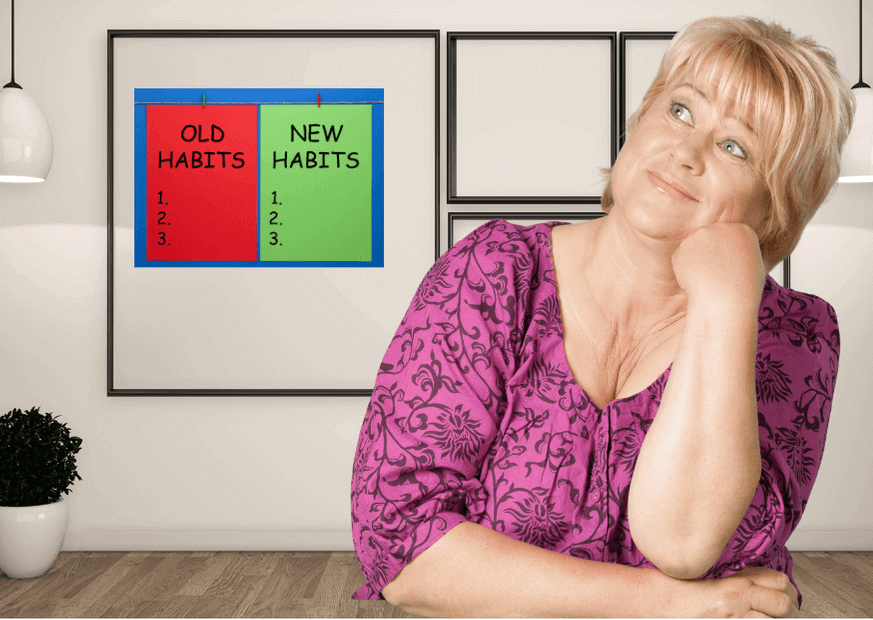Unlock the potential of habits change during middle age. Elevate your quality of life and well-being by adopting new, empowering habits. Take control of your journey through middle age with positive changes that can lead to a more fulfilling future.
Middle age is a remarkable phase of life that offers personal growth and transformation opportunities. It’s when we reflect on our past choices while looking forward to the future.
Amidst this introspection, we realize that embracing change in middle age is beneficial and often necessary. Our habits, deeply ingrained over the years, play a pivotal role in shaping our well-being during this pivotal period.
This article delves into the profound impact of changing habits in middle age, exploring how it can elevate the quality of life, enhance health, and empower personal growth.
Why is it so difficult to change habits in middle age?
Changing long-standing habits in middle age can be tough despite the potential benefits for our well-being and overall quality of life.
This difficulty stems from how our brains often resist our efforts to overcome bad habits. Certain behaviours become automatic as time passes, and our minds tend to favour short-term pleasure over long-term satisfaction.
Whether adopting a healthier diet, incorporating regular exercise, or breaking free from addiction, the path to change requires substantial effort and unwavering commitment.
Here are some key challenges faced when trying to change habits in middle age:
Negative emotions
Initiating change based on negative emotions such as guilt or shame can be an initial motivator. However, these short-lived emotions make it difficult to maintain newly established habits. It’s essential to discover positive motivations, like better health and overall well-being, as they are vital for creating lasting and sustainable change.
Feeling overwhelmed
Trying to change multiple habits simultaneously can lead to feeling overwhelmed. Managing numerous changes at once can be mentally and emotionally exhausting, reducing the chances of success. Starting with one or two manageable changes and gradually building upon them allows for a sense of accomplishment and boosts confidence.
Too many distractions
Overhauling one’s entire lifestyle in one go is a common mistake. Setting overly ambitious goals can lead to burnout and may not be sustainable. Instead, prioritising and tackling one habit simultaneously allows for gradual, sustainable progress.
Forget that failure guides our path
Failures are essential to the journey to change habits. They should be viewed as learning experiences that highlight areas needing more attention in the process. As the saying goes, “When a flower doesn’t bloom, you fix the environment in which it grows, not the flower.” Learning from failures is a crucial step toward lasting change.
Not seeing change as a commitment
Commitment is vital to habit change. Without a firm and unwavering commitment to change, progress is unlikely. Recognise that change requires dedication and clarity about what and how you plan to achieve it.
In summary, it’s crucial to recognise that motivation driven by negative emotions, feeling overwhelmed, attempting to change too much at once, ignoring the value of failure as a guide, and not committing fully can hinder habit changes, especially in middle age. By addressing these challenges and adopting a balanced, sustainable approach, individuals can increase their chances of successfully modifying their habits for the better.
Why change your habits in middle age
Reaching 40 is a time for introspection and looking towards the future, where we understand that change is essential. Life undergoes significant transformations after this milestone, prompting questions about how we can ensure our bodies function optimally.
One of the primary considerations is adopting healthier eating habits. As our metabolism tends to slow down with age, focusing on a diet rich in vegetables, lean proteins, and complex carbohydrates becomes a priority.
Middle age often inspires women to contemplate a healthier lifestyle, including regular exercise to enhance their overall well-being.
Research conducted in the United States underscores the importance of these habits, “They found that women who practised four or five of the healthy habits at age 50 lived an average of 34.4 more years free of diabetes, cardiovascular diseases, and cancer, compared to 23.7 healthy years among women who practised none of these healthy habits“.
Furthermore, positive changes made during middle age can also help alleviate the symptoms of menopause, particularly those intensified by unhealthy habits or substance misuse.
Lastly, facing life challenges, such as job loss or divorce, can resurface during this time. Understanding our circumstances empowers us to recover effectively, rebuild self-esteem, and take meaningful steps toward a brighter future.
A step-by-step guide to change life in middle age
Changing habits after reaching the age of 40 requires a systematic approach. Here’s a step-by-step guide to facilitate this transformative journey:
- Identify habits: Begin with self-awareness. Identify the patterns in your life that need modification. Analyse your behaviours and pinpoint those that may be detrimental to your well-being.
- Find the need to change: Understand the driving forces behind your desire to change certain habits. This motivation can stem from seeking new relationships, losing weight, or pursuing a new career.
- Plan: Just as in other aspects of life, planning is crucial for habit change. Please select one or two behaviours you wish to adopt and integrate them into your daily routine. Start small and gradually expand your efforts.
- Persist: It’s essential to acknowledge that setbacks and failures are a part of the process for anyone attempting change. Instead of giving up, embrace persistence as your ally. Overcoming obstacles will ultimately lead you to your goals.
Summary
Changing habits in midlife, especially after age 40, can be challenging due to various factors. These hurdles include battling ingrained behaviours, navigating negative emotions, and attempting to change too much at once. However, it’s crucial to recognise the significance of altering habits for improved well-being.
Understanding the reasons behind these challenges, such as prioritising short-term pleasure over long-term satisfaction, is the first step towards successful habit change. Finding positive motivations and avoiding being overwhelmed by making gradual changes is essential.
Moreover, embracing failures as learning experiences and committing to the change process are vital aspects of this journey. Recognising that self-improvement is a continuous commitment can help individuals navigate the path to healthier habits in middle age.
Are you ready to embrace positive changes and improve your life after 40?
Start by identifying the habits you want to modify and find the motivation to drive these changes.
Remember that persistence is critical, and failures are stepping stones to success. Take the first step today to lead a healthier, more fulfilling life in midlife and beyond.
Please share your experiences and insights in the comments below to inspire and support others to change their habits after 40.


